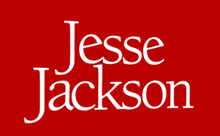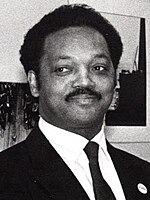Jesse Jackson 1988 presidential campaign
| Jesse Jackson 1988 presidential campaign | |
|---|---|
 | |
| Campaign | 1988 Democratic Party presidential primaries 1988 United States presidential election |
| Candidate | Reverend Jesse Jackson Sr. |
| Affiliation | Democratic Party |
| Status | Withdrawn |
| Slogan | Keep Hope Alive |
| Chant | If my mind can conceive it and my heart can believe it I know I can achieve it |
The 1988 Jesse Jackson presidential campaign was Jesse Jackson's second campaign for President of the United States. This time, his successes in the past made him a more credible candidate and he was both better financed and better organized. Although most people did not seem to believe he had a serious chance at winning, Jackson once again exceeded expectations as he more than doubled his previous results, prompting R. W. Apple, Jr. of The New York Times to call 1988 "the Year of Jackson".[1]
The campaign
[edit]
Jackson and eventual nominee Michael Dukakis outlasted all other Democratic candidates to the final primaries, including California. Jackson came in second in delegates behind Dukakis. Jackson beat out candidates future Vice President Al Gore, future President Joe Biden, and Dick Gephardt, among others. In early 1988, Jackson organized a rally at the former American Motors assembly plant in Kenosha, Wisconsin, approximately two weeks after new owner Chrysler announced it would close the plant by the end of the year. In his speech, Jackson spoke out against Chrysler's decision, stating "We have to put the focus on Kenosha, Wisconsin, as the place, here and now, where we draw the line to end economic violence!" and compared the workers' fight to that of the civil rights movement in Selma, Alabama. As a result, the UAW Local 72 union voted to endorse his candidacy, even against the rules of the UAW. However, Jackson's campaign suffered a significant setback less than two weeks later when he was defeated handily in the Wisconsin primary by Michael Dukakis. Jackson's showing among white voters in Wisconsin was significantly higher than in his 1984 run, but was also noticeably lower than pre-primary polling had indicated it would be. The discrepancy has been cited as an example of the so-called "Bradley effect".[2]
Jackson's campaign had also been interrupted by allegations regarding his half-brother Noah Robinson, Jr.'s criminal activity.[3] Jackson had to answer frequent questions about his brother, who was often referred to as "the Billy Carter of the Jackson campaign".[4]
On the heels of Jackson's narrow loss to Dukakis the day before in Colorado, Dukakis' comfortable win in Wisconsin terminated Jackson's momentum. The victory established Dukakis as the clear Democratic frontrunner, and he went on to claim the party's nomination, but lost the general election in November.[5] In both races, Jackson ran on what many considered to be a very liberal platform. Declaring that he wanted to create a "Rainbow Coalition" of various minority groups, including African Americans, Hispanics, Middle Eastern Americans, Asian Americans, Native Americans, family farmers, the poor and working class, and LGBT people, as well as white progressives, Jackson ran on a platform that included:
- creating a Works Progress Administration-style program to rebuild America's infrastructure and provide jobs to all Americans,
- reprioritizing the War on Drugs to focus less on mandatory minimum sentences for drug users (which he views as racially biased) and more on harsher punishments for money-laundering bankers and others who are part of the "supply" end of "supply and demand"
- reversing Reaganomics-inspired tax cuts for the richest ten percent of Americans and using the money to finance social welfare programs
- cutting the budget of the Department of Defense by as much as fifteen percent over the course of his administration
- declaring Apartheid-era South Africa to be a rogue nation
- instituting an immediate nuclear freeze and beginning disarmament negotiations with the Soviet Union
- giving reparations to descendants of black slaves
- supporting family farmers by reviving many of Roosevelt's New Deal–era farm programs
- creating a single-payer system of universal health care
- ratifying the Equal Rights Amendment
- increasing federal funding for lower-level public education and providing free community college to all
- applying stricter enforcement of the Voting Rights Act and
- supporting the formation of a Palestinian state.
With the exception of a resolution to implement sanctions against South Africa for its apartheid policies, none of these positions made it into the party's platform in either 1984 or 1988.
Results
[edit]| External videos | |
|---|---|
Jackson captured 6.9 million votes and won 11 contests: seven primaries (Alabama, the District of Columbia, Georgia, Louisiana, Mississippi, Puerto Rico and Virginia) and four caucuses (Delaware, Michigan, South Carolina, [led by state campaign manager activist Kevin Alexander Gray[8]] and Vermont).[9] Jackson also scored March victories in Alaska's caucuses and Texas's local conventions, despite losing the Texas primary.[10][11] Some news accounts credit him with 13 wins.[12] Briefly, after he won 55% of the vote in the Michigan Democratic caucus, he was considered the frontrunner for the nomination, as he surpassed all the other candidates in total number of pledged delegates. Jackson was the first black candidate to win the nationwide Democratic youth vote among all Democratic primary voters, a significant national demographic, the voters aged 30 and below, beating Dukakis and the other candidates in this demographic.
Campaign Chairs included Cong. Maxine Waters and Willie Brown, Speaker of the California Assembly. Staff for Jackson included Frank Watkins, political adviser; campaign manager Gerald Austin; Betty Magness, headquarters operations manager; Minyon Moore, senior political adviser; Frank Clemente, policy director; Eddie Wong, field director; Steve Cobble, delegate coordinator; Rae Lewis, youth director; Pam Watkins, press secretary; and Troy Deckert, deputy youth director.
Hindsight following the 2008 election of Barack Obama
[edit]Following the election of Barack Obama in 2008 as the first African-American to become U.S. President, Jackson was asked about his emotion regarding the 20-year wait for an African American man to reach the nation's highest office, and noted that while he had played some role in helping to create the circumstances for the 2008 election, his remark was not to diminish the efforts of the Obama campaign. Jesse Jackson thought that it would be interesting to be the first African- American President, but he felt that losing the election helped him focus more on his non-profit organization (PUSH) and his family. [citation needed]
Endorsements
[edit]- Federal officials
- Ernest Hollings, United States Senator from South Carolina[13]
- State officials
- Orval Faubus, segregationist and former governor of Arkansas[14]
- Municipal officials
- Bernie Sanders, mayor of Burlington, Vermont[15]
- Harold Washington, mayor of Chicago[16]
- Individuals
- Casey Kasem, disc jockey[17][18]
- Paul Wellstone, activist and nominee for Minnesota State Auditor in 1982[19]
- Celebrities
- Byron Allen, film producer[18]
- Debbie Allen, actress[18]
- Susan Anspach, actress[18]
- Robert Blake, actor[18]
- Ned Beatty, actor[18]
- Eileen Brennan, actress[18]
- Gary Busey, actor[18]
- Bill Cosby, actor and comedian[20][18]
- Robert Foxworth, actor[18]
- Anthony Franciosa, actor[18]
- Louis Gossett Jr., actor[18]
- Valerie Harper, actor[18]
- John Heard, actor[18]
- Gregory Hines, actor[18]
- Margot Kidder, actress[18]
- Diane Ladd, actress[18]
- Spike Lee, director[18]
- Cleavon Little, actor[18]
- Elizabeth Montgomery, actress[18]
- Oz Scott, director[18]
- Martin Sheen, actor[18]
- Cicely Tyson, actress[18]
- Dennis Weaver, actor[18]
- Musicians
- Carl Anderson, singer[18]
- Jackson Browne, singer[18]
- Irene Cara, singer[18]
- Natalie Cole, singer[18]
- Rita Coolidge, singer[18]
- David Crosby, singer[18]
- Sammy Davis Jr., singer[18]
- Roberta Flack, singer[17]
- Aretha Franklin, singer[17]
- Dick Griffey, producer[18]
- Herbie Hancock, pianist[18]
- Phyllis Hyman, singer[17]
- Al Jarreau, singer[18]
- Quincy Jones, producer[17][18]
- Gladys Knight, singer[18]
- Kris Kristofferson, singer[17][18]
- Melba Moore, singer and actress[17]
- Willie Nelson, singer[18]
- Bonnie Raitt, singer and guitarist[18]
- Lou Rawls, singer[17]
- Helen Reddy, singer[18]
- Buffy Sainte-Marie, singer[18]
- Pete Seeger, singer[17]
- Bob Seger, singer[18]
- Mary Wilson, singer[18]
- Stevie Wonder, singer[18]
- Newspapers and publications
References
[edit]- ^ R. W. Apple, Jr. (1988-04-29). "Jackson is seen as winning a solid place in history". The New York Times. Retrieved 2014-01-30.
- ^ Polman, Dick. (2007, January 21). "Barack Obama's race seems to be a second-tier issue", The Philadelphia Inquirer, "The American Debate"
- ^ Robinson had a long running feud with a criminal named Leroy "Hambone" Barber who had been convicted of armed robbery against Robinson. While Barber was imprisoned Robinson had written letters to him stating that he would enact a violent revenge upon him upon his release from prison. (These letters would come back to haunt Robinson at a future date). Noah Robinson had made good on his violent promise by contacting imprisoned gang leader and longtime friend Jeff Fort and wiring him $10,000 to assemble a hit team to hunt down Leroy Barber and have him murdered. Through a HUMINT asset in Jeff Fort's El Rukn gang, the Illinois State Police was able to conclude that Robinson had ordered the murder, and he was convicted of first degree murder and sentenced to life imprisonment.
- ^ Shakedown by Kenneth Timmerman
- ^ Dionne, E. J. Jr. (1988, April 6). "Dukakis Defeats Jackson Handily in Wisconsin Vote", The New York Times
- ^ 10 O'Clock News, Is Jesse Jackson unelectable?, 03/04/1988, WGBH Media Library & Archives, accessed September 23, 2016.
- ^ Ten O'Clock News; Outcome of Michigan caucuses, 03/28/1988, WGBH Media Library & Archives, accessed September 23, 2016.
- ^ Edsall, Thomas B. (March 13, 1988). "JACKSON WINS WITH MAJORITY IN SOUTH CAROLINA CAUCUSES". Washington Post. Retrieved June 2, 2023.
- ^ Keep Hope Alive. Jesse Jackson, pages 234-235.
- ^ "Jackson and Dukakis Lead in Texas Voting". The New York Times. Associated Press. March 20, 1988. Retrieved January 30, 2014.
- ^ Hal Spencer (March 12, 1988). "Jackson edges out Dukakis in Alaska". The New York Times. Retrieved 30 January 2014.
- ^ Kevin Merida (December 27, 2007). "The Steepest Climb". The Washington Post. Retrieved January 30, 2014.
- ^ "Jackson: I Deserve More Superdelegates - tribunedigital-chicagotribune". Archived from the original on 2016-11-29. Retrieved 2016-11-28.
- ^ William Raspberry (1988-04-29). "JESSE JACKSON'S VICTORY". The Washington Post. Washington, D.C. ISSN 0190-8286. OCLC 1330888409.
- ^ Wagner, John (February 15, 2016). "Bernie Sanders highlights his 1988 support of Jesse Jackson's White House run". The Washington Post. Retrieved September 9, 2021.
- ^ Oreskes, Michael (9 September 1987). "Chicago's Mayor Endorses Jackson". The New York Times. Retrieved 4 December 2019.
- ^ a b c d e f g h i "Big Stars back Jackson". 8 April 1988.
- ^ a b c d e f g h i j k l m n o p q r s t u v w x y z aa ab ac ad ae af ag ah ai aj ak al am an ao ap aq ar "Campaign '88 Gets the Star Treatment". 7 June 1988.
- ^ "Paul Wellstone's Legacy". In These Times. 12 October 2012. Retrieved 2021-06-21.
- ^ "User Clip: Bill Cosby for Jesse Jackson | C-SPAN.org". www.c-span.org. Retrieved 2021-06-21.
- ^ "For Jesse Jackson and His Campaign". The Nation. 1988-04-16. ISSN 0027-8378. Retrieved 2021-06-21.
